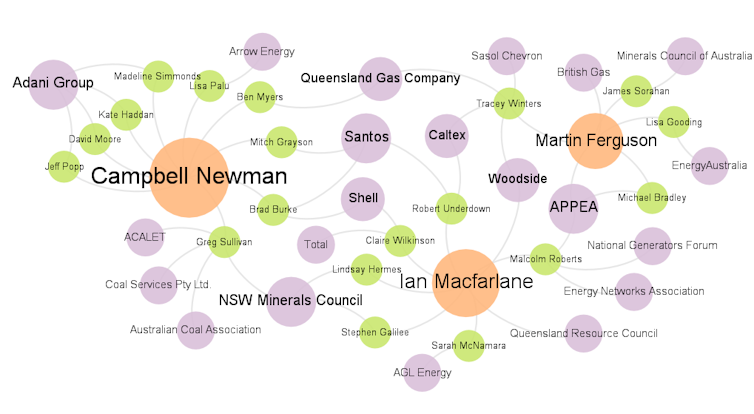March 5, 2018
Revealed: the extent of job-swapping between public servants and fossil fuel lobbyists
Close ties between senior politicians, former political staffers, and the big end of town have had a real and lasting impact on the perception of political transparency in Australia.
Last month Australia slipped further down the rankings in the international corruption index. Among a wide range of factors cited by Transparency International was Australia’s “inappropriate industry lobbying in large-scale projects such as mining”, as well as “revolving doors and a culture of mateship”.
As several high-profile cases have recently revealed, the close ties that continue to exist between senior politicians, former political staffers, and the big end of town have had a real and lasting impact on the perception of political transparency in Australia.
Read more:
Two examples from 2016 and 2017 clearly illustrate the extent to which such relationships can have a toxic effect on democracy.
During last year’s Queensland election campaign, the that Cameron Milner, former Queensland secretary of the ALP and chief of staff to federal Opposition Leader Bill Shorten, had been the main lobbyist and go-between for Indian mining giant Adani.
Earlier in the year, it was that former federal trade minister Andrew Robb walked straight out of his ministerial position in July 2016 to take up a lucrative position as a “high-level consultant” for Chinese-owned company Landbridge. This was the same firm that Robb had when it controversially acquired a 99-year lease for the Port of Darwin in 2015.
The cases of Milner and Robb not only suggest that such influence-peddling is politically bipartisan in nature, but that it can happen both during and after the relevant parties have left their positions in the public sector.
Revolving door or golden escalator?
Much has been made in recent weeks of the provisions contained in the . Among , the code bans former ministers from lobbying the federal government for 18 months after leaving office. But given the fact that no current or former minister has been deemed to be non-compliant (including ), one could be forgiven for concluding that the code is simply a cover for business as usual.
Several prominent public figures and NGOs, including and urban planner , have argued that the mining, energy, property and gaming industries enjoy favourable treatment in exchange for their , or at least are . There’s also widespread public acceptance that the from the prime ministership in 2010.
What is less well known is the extent to which big business has sought to bend the will of the body politic by directly influencing the formation of government policy.
This is not just done through lobbying. All of these industries have been proactive in courting individuals who hold public office in relevant portfolios as potential allies and future employees. Some are employed as lobbyists, some as advisors, some as consultants, and others as board members and company directors. This allows these industries to shape tax and regulatory regimes in their favour, and to drive major government and private sector .
The phenomenon we seek to highlight has previously been referred to as the “revolving door” between the political and corporate realms. But although there is ample evidence for these kinds of arrangements, on closer inspection they look more like a golden escalator. The financial rewards on offer in the private sector can dwarf anything received by senior politicians and public servants while in office.
For evidence of this dynamic, we need only to look to former resource ministers Martin Ferguson and Ian Macfarlane. Ferguson took up a position as a non-executive director of British Gas just weeks after leaving federal politics in September 2013, having already become chair of an advisory board for Australia’s oil and gas peak body, APPEA in October. Macfarlane, meanwhile, was appointed only four months after leaving federal politics.

The ‘service elevator’
There is another strategy that has also been used to great effect by the fossil fuel and mining industries in recent years. It is also used by powerful corporations in other economic sectors such as agribusiness, pharmaceuticals, gaming, and construction.
The industries in question either hire former ministerial staffers and policy analysts with relevant knowledge and expertise to advise them, or they encourage their own former staffers to take on positions as government advisers while maintaining close links with them. When acting as staffers, these individuals are free to operate outside of public scrutiny and regulatory reach. This allows them to move seamlessly between the offices of powerful political figures and some of Australia’s largest resource companies and industry bodies.
We have compiled a database of more than 180 individuals who have moved between positions in the fossil fuel and/or mining industries and senior positions in government, or vice versa, over the past decade. This includes senior political staffers working for prime ministers and state premiers. We have also found examples of key ministers hiring individuals straight from the fossil fuel and mining industries, who then return to those industries straight after leaving government. This revolving door might be better dubbed a “service elevator”, ensuring that “delivery of the goods” happens away from public scrutiny.
Questions of influence
Australian governments clearly need to enact laws at the state and federal levels to prevent these kinds of activities.
We know that such legislation is not without precedent, and is therefore politically feasible. For example, in Ireland, the cooling-off period was , whereas in Canada it is and in the United States, .
But it is not just the rules around that require reform. Many other areas of are also in dire need of attention, including much stronger disclosure laws in relation to campaign financing and political donations, and a significant increase in , apportioned on the basis of electoral support.
Most significant, however, is the need for a with . While there has been resistance from the to the creation of a federal anti-corruption watchdog, it would appear that the tide is turning. Prime Minister Malcolm Turnbull , as did .
Read more:
If our political leaders are not prepared to provide more transparency and accountability with respect to government decision-making, then we can only assume the resource extraction industries will continue to call the shots on Australia’s transport and energy policies.
Our collective failure to deal with these issues will ensure that the increasingly dire predictions about being breached over the next few decades will indeed be realised.
![]() This article was co-researched by Joel Rosenzveig, who has previously worked with GetUp! and Greenpeace, and is in the middle of a Master of Political Economy degree at Sydney ÁñÁ«ÊÓƵapp.
This article was co-researched by Joel Rosenzveig, who has previously worked with GetUp! and Greenpeace, and is in the middle of a Master of Political Economy degree at Sydney ÁñÁ«ÊÓƵapp.
, Senior Lecturer, Science and Technology Studies Program,
This article was originally published on . Read the .
UOW academics exercise academic freedom by providing expert commentary, opinion and analysis on a range of ongoing social issues and current affairs. This expert commentary reflects the views of those individual academics and does not necessarily reflect the views or policy positions of the ÁñÁ«ÊÓƵapp of ÁñÁ«ÊÓƵapp.
